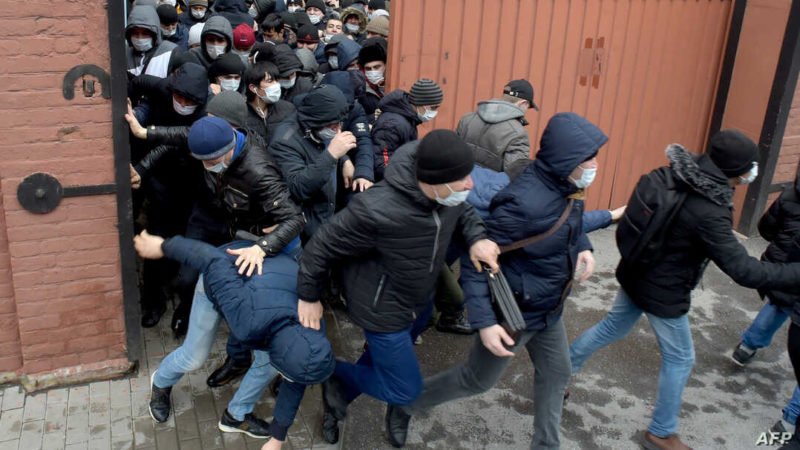The vulnerability of the Central Asian Migrant Workers amid Coronavirus Pandemic

The largest country, the Russian Federation, is a significant destination for both Central Asian and South Caucasian migrants. Russia has lived alongside the peoples of Central Asia for 150 years, and for centuries they were neighbours before those countries became part of the Russian Empire. After the breakdown of the soviet empire, these Central Asian countries gained independence. Majority of these countries share a common language, culture, historical background with that of the Russian Federation. The region is mainly poor with the majority of the countries like Tajikistan, Uzbekistan, Kyrgyzstan depend on the labour migrants remittances for livelihood. Russia is a host country for millions of labour migrants from Kyrgyzstan, Tajikistan and Uzbekistan, where since the early 1990s unemployment has been a major problem. Some of these migrants in the national labour markets are filling a gap by taking work that native Russians don’t want. Labour migrants mostly work in the informal sector, where they are vulnerable to exploitation and harassment by recruiters, employers, and authorities due to lack of legal security and inadequate knowledge about the rights they have.

Covid-19 impact
The advent of the new coronavirus changes drastically a region’s social and economic profile, which accounts for one-sixth of the world’s land, and it will take years to recover. According to the World Health Organization (WHO), the Russian Federation has reported 344,481 COVID-19 cases since January 31; 3,541 people have died as of May 25, 2020. Now, with the world’s second-highest number of coronavirus infections, Russia has shut down building sites, factories and other workplaces that provided Central Asian workers with a lifeline. This measure especially affected Uzbekistan’s two million or so migrants, and Tajikistan’s 700,000, the two Central Asian countries that send the largest number of migrant workers to the Russian Federation. Russia’s anti-coronavirus initiatives, which have been tearing through the country in recent weeks, have left hundreds of thousands of migrants’ unemployed, and stuck inside. Hundreds of thousands of migrants from Central Asia are trapped in Russia’s quarantine lockdown, lacking jobs, livelihoods and free access to health care. Remittance flows of several regional economies have slowed to a trickle, IOM says. Hundreds of thousands of jobs have also been lost overseas, with millions of families at risk of rapid sliding into severe poverty.
According to the Office for Migration of the Ministry of Internal Affairs of Russia, Moscow is home to over 1.6 million migrants, mostly from the five post-Soviet Central Asian republics. In 2019, 19 million foreign workers were officially employed in Russia. The unofficial numbers could be quite high as 74.5 million Russian workers are employed across the country. And according to some figures, some 60 per cent of migrants are illegal in the country. Irrespective of the status of workers, Russian authorities are infamous for their mistreatment of migrant workers. These migrant workers mainly work in the informal sector of the economy like cleaning, service, housing and communal services or on construction sites. With the advent of the pandemic, these economic sectors were the hardest hit by the self-isolation regime that was introduced on March 30 in Moscow. Around 2.2 million legally registered migrants working in Moscow and its surroundings have lost jobs in construction and other sectors. The actual figure is likely to be much higher, as millions of economic migrants many from poor Central Asian republics work in the grey economy where employers can easily exploit or cheat. Those left without work couldn’t pay for their job permits. Migrants are not entitled to receive State assistance. All foreign citizens with visa-free access to Russia (except those of fellow members of the Eurasian Economic Union: Armenia, Belarus, Kazakhstan and Kyrgyzstan) are expected to have these documents. An initial employment permit registration costs 12,750 rubles (£140), followed by monthly payments afterwards. A monthly salary in Moscow comes to 5,350 rubles (£60) which is a huge sum for an unemployed person. Labour migrants in Russia stay in cramped housing, which hypothetically threatens coronavirus spread. The danger lies in the huge shared rooms filled with bunk beds for those in dormitories. In early April the first positive cases of coronavirus among labour migrants in Russia began to be recorded.

Assistance by the Russian Federation
On 19 March 2020, the Ministry of Interior of the Russian Federation allowed migrants to apply for new work permits and extend their temporary residency permits. Because the borders of the country had already been closed, this allowed many migrants to stay legally within the country. A month later, on April 18, Russian President Mr Putin passed a decree exempting migrants from payments from March 15 to July 15 for their work permits. For the same time, the validity of temporary residency permits and migrant cards was extended. Migrant employees breathed a relieving sigh. No one at the time, however, had expected the self-isolation steps to drag on until May. The Central Asian states’ embassies chartered flights to evacuate their citizens from Russia right up until the beginning of April. Late in the crisis, the most distressed migrants took to sleep in airports when flights were cancelled, hoping for a fortunes reversal. Other labour migrants, meanwhile, started to arrive without tickets at Russian airports, hoping to find a way home. Those migrants who do make it home return to unemployment, stigma and potential social unrest. Migration centres in Moscow and St. Petersburg have fallen into chaos as migrants’ crowds have engulfed them up to renew work and residence permits. This led to the establishment of the Council for Migrant Assistance in early April, which included representatives from Uzbekistan ‘s Embassy, Uzbekistan’s Agency for External Labour Migration, and Kyrgyzstan ‘s State Migration Service, along with human rights defenders, lawyers, journalists and various NGOs. It provides counselling and psychological assistance, helps call an ambulance, and provides food and medicine to migrants living in apartments and hostels. Russia’s home affairs ministry announced it would allow migrants to extend their stay, but the procedure was not properly outlined. Furthermore, the service centre in Moscow which processed registration documents closed on 30 March, leaving many in limbo. According to the IOM (International Organization for Migration), 60% of migrants could not pay their rent and more than 40% could not afford food in the Russian Federation.

The exploitation of the migrant workers
Housing is the principal burden on foreign migrants who have lost their jobs in Russia. Russian authorities have allowed companies to postpone payments on leases, but ordinary citizens have not been given such freedoms. And most landlords also aren’t willing to help. It’s important to remember that Central Asian migrants in Russia were faced with xenophobia and discrimination long before COVID-19 came on stage. Yet the border closures and quarantine restrictions have exacerbated their already precarious condition, leaving many unemployed, vulnerable and with no choice as to where the pandemic should be waiting. Local human rights organizations’ ability to assist needy migrants is also severely restricted due to discriminatory “foreign agent” laws, which were adopted in 2014 and tightened this year even more. They target groups of civil society receiving foreign funds or conducting what authorities find to be “political activity.” In one of the most mobile regions in the world, where millions migrate for work between Central Asia and the Russian Federation, over 80 per cent of migrants surveyed by IOM and its partners record either a decrease or a complete loss in their income. Amid the pandemic, many migrants will be pushed into the shadow economy, where they will be further abused and their physical and mental health undermined.

Response from the International Organizations
On Thursday 15th May 2020, the International Organization for Migration (IOM) launched an urgent $7 million appeal to ease COVID-19’s impact on migrant communities in five Central Asian countries and the Russian Federation, where the pandemic is pushing an increasing number of migrant workers into poverty. The appeal aims to help thousands in Kazakhstan, Kyrgyzstan, the Russian Federation, Tajikistan, Turkmenistan and Uzbekistan who are stranded. IOM aims to assist in governments and societies addressing the effects of labour market instability and significant decline in remittance flows.
Despite the rise of nationalistic and xenophobic attitudes in Russian society, the diminishing population of the country greatly needs significant imports of foreign labour. For Central Asian governments, the current crisis involving their citizens employed in Russia has perhaps once again demonstrated that they can boost the effectiveness of their attempts to protect their people abroad if they collaborate with local civil society organizations.


















